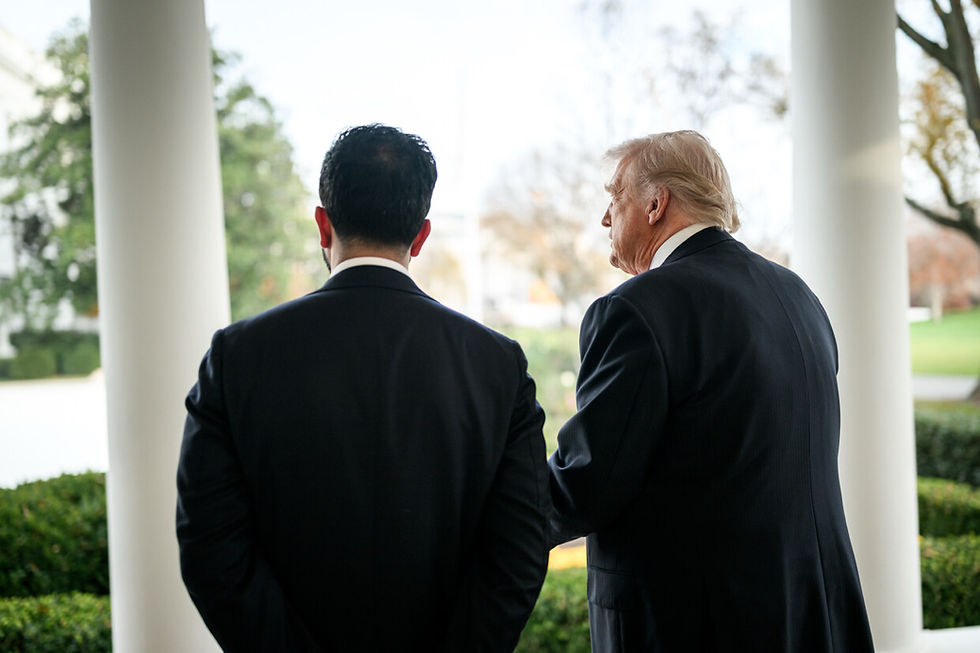From “Great Game” to “Great Gain”: Power and Politics in Central Asia
- Brock Salvatore Cullen-Irace

- Jul 1, 2025
- 4 min read

Central Asia, often considered one of the least integrated areas in the international system, represents perhaps the most overlooked theatre of contemporary international politics. Despite its strategic trade location between East and West, abundance of raw materials, oil, gas and rare minerals, and large population, Central Asia has remained largely overlooked, and its five states have exerted limited influence on global affairs.
The region was once the stage of great power rivalry throughout the 19th century, as the British and Russian Empires vied for influence in the so-called ‘Great Game’. Characterised by strategic power projection, diplomatic intrigue, deception, and regional wars, the Great Game regulated virtually all foreign policy decisions in the Imperial capitals of London and Saint Petersburg, yet never escalated into direct conflict between the European powers. For this reason, it was dubbed the ‘Tournament of Shadows’ by the Russians, who ultimately conquered Central Asia’s various Khanates, incorporating them into the Russian Empire.
Following the dissolution of the Soviet Union, five Central Asian republics, Kazakhstan, Kyrgyzstan, Tajikistan, Turkmenistan, and Uzbekistan, emerged as independent states. However, Moscow has continuously viewed them as firmly within Russia’s ‘Near Abroad’: a post-Soviet space regarded as existing within its exclusive sphere of influence.
Maintaining a quasi-hegemonic relationship with these former Soviet Republics, Russia is committed to keeping them in geopolitical orbit, with all the states members of at least one of the Russian-dominated international institutions: the Commonwealth of Independent States, the Eurasian Economic Union, and the Collective Security Treaty Organization.
Culturally, the Russian language remains the regional lingua franca, and Russia’s cultural exports, such as cinema and television, retain widespread popularity across the Central Asian republics. Additionally, there are millions of Central Asian migrants working in Russia, a dynamic which not only helps perpetuate the importance of the Russian language but also reinforces economic ties and cultural exchange between Russia and the region.
Keeping Central Asia friendly remains vitally important to an increasingly economically and politically isolated Russia. Above all, Moscow seeks to retain military primacy, asserting that it is the only nation capable of ensuring regional security.
The Kremlin views Central Asia as a potential “soft underbelly” to national security; a source of political instability, religious terrorism, and organised crime. Concerns over a potential “spillover” into Russian territory via the region’s loosely controlled and sparsely populated border have grown, particularly since the Taliban’s return to power in Afghanistan, which Moscow worries may embolden jihadists across the Muslim populations of Central Asia. These fears have intensified since the 2024 terror attack at Moscow’s Crocus City Hall, perpetrated by Islamic State-affiliated Tajik nationals.
However, the era of Central Asia as Russia’s exclusive geopolitical domain is over.
The ongoing War in Ukraine has had an eroding effect on Russia’s privileged status in the Near Abroad: the invasion of a neighbouring post-Soviet state with a sizeable Russian minority has, understandably, made the Republics suspicious of Moscow’s geopolitical motives. Additionally, the poor success rate of the military has undermined Russian security guarantees.
Russia’s waning influence has coincided with China’s increased efforts to expand its regional footprint: Beijing has invested significantly in Central Asia via the Belt and Road Initiative and financial loans. It has financed critical infrastructure projects, such as nuclear power plants, and prioritised the expansion of bilateral trade. Already the leading trade partner of Uzbekistan and Kazakhstan, China is rapidly gaining economic prominence among the other Central Asian states as well.
All but Turkmenistan are full members of the Beijing-led Shanghai Cooperation, while China declared itself a regional security provider, announcing at the first “China-Central Asia Summit” that Beijing is committed to strengthening regional security and defence.
China’s increasing foothold and influence have already led analysts to envision a future Central Asian “Sinostan”. As a result, it has become fashionable to talk of a “New Great Game”: a renewed contest for primacy in Central Asia, with China replacing Britain as Russia’s great nemesis. Prevailing knowledge in international politics thus dictates that this power transition represents a regional Thucydides’ Trap, and that Moscow and Beijing are destined for direct competition.
Within Russia, there is some concern over Chinese encroachment, with one noted journalist decrying that “Russia is absolutely surrendering Central Asia - conquered with considerable blood and built by Russia - to China”.
However, this “New Great Game” conception is flawed. China is not alone in trying to capitalise on Russia’s weakening grip: The European Union is planning to invest over $10 billion and has adopted the Samarkand Declaration as a means to deepen economic ties and collective security cooperation; Turkey is appealing to shared Turkic heritage and cultural traditions to increase its political and economic influence in the region which Ankara now refers to as “Turkestan”; India, always eager to counterbalance Chinese power, has moved to secure economic opportunities. Central Asia has even seriously returned to the minds of policymakers in London for the first time in over a century. The United Kingdom committed £50 million in development spending and has invested in water infrastructure and English language schemes.
Some describe this as a “scramble for Central Asia”, but another reality is apparent.
The Republics have emerged as confident regional actors in their own right, and are pursuing a diverse, multi-vector foreign policy, collectively engaging with as many geopolitical poles as possible to reduce reliance on any single power. Not content with replacing one hegemon for another, the Republics are “playing both sides”, refusing to align themselves with any bloc. While cultivating Chinese investment and European partnership, they do not want to turn their back on Russia.
Analysts were quick to simply assume Central Asia would pass from Russian to Chinese dominance, ignoring the possibility that Central Asians could be the masters of their own destinies.
The increased agency and adept geopolitical acumen of Central Asia was best articulated by President Kassym-Jomart Tokayev of Kazakhstan: “We do not believe in zero-sum games. We wish to replace the “Great Game” with Great Gain for all in the Heart of Eurasia”.
Illustration by Will Allen/Europinion
.png)



Comments